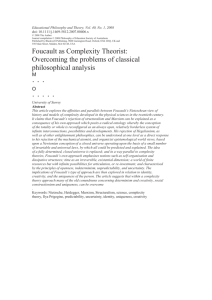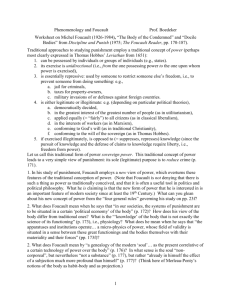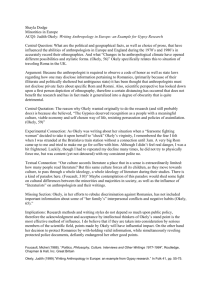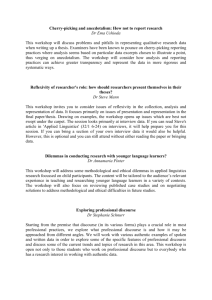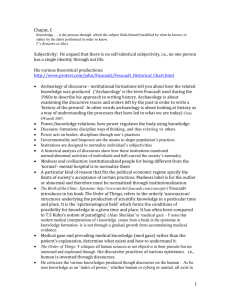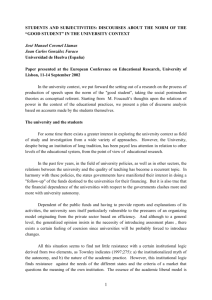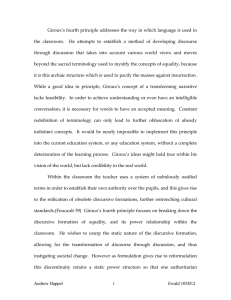Handout 16: Deb Curtis
advertisement
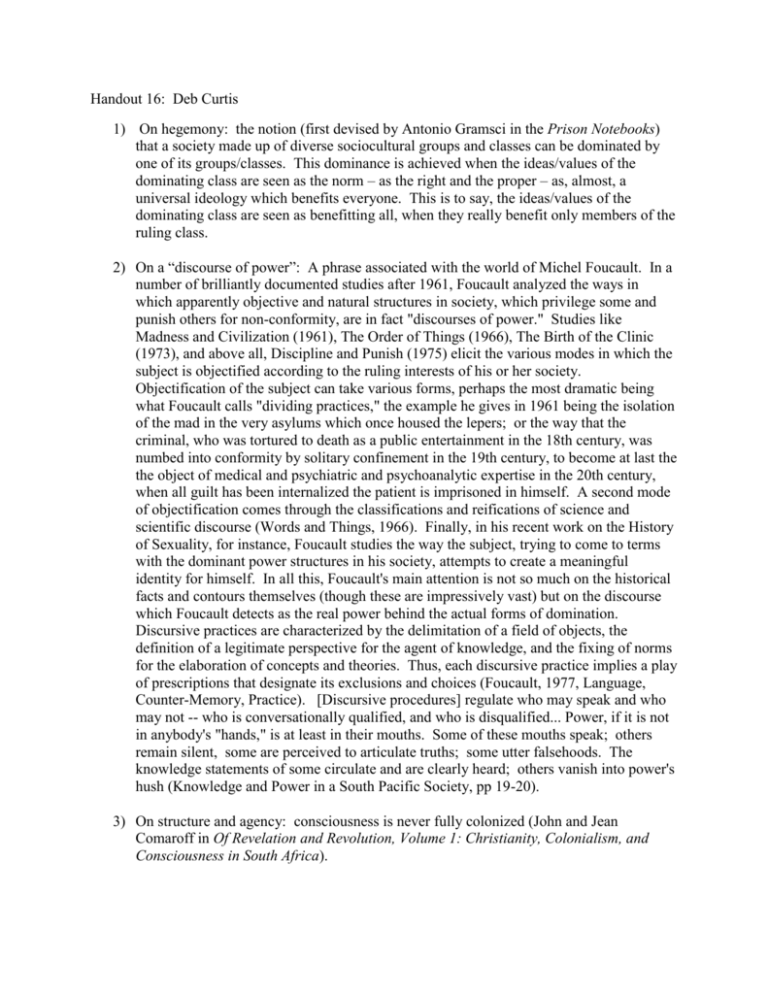
Handout 16: Deb Curtis 1) On hegemony: the notion (first devised by Antonio Gramsci in the Prison Notebooks) that a society made up of diverse sociocultural groups and classes can be dominated by one of its groups/classes. This dominance is achieved when the ideas/values of the dominating class are seen as the norm – as the right and the proper – as, almost, a universal ideology which benefits everyone. This is to say, the ideas/values of the dominating class are seen as benefitting all, when they really benefit only members of the ruling class. 2) On a “discourse of power”: A phrase associated with the world of Michel Foucault. In a number of brilliantly documented studies after 1961, Foucault analyzed the ways in which apparently objective and natural structures in society, which privilege some and punish others for non-conformity, are in fact "discourses of power." Studies like Madness and Civilization (1961), The Order of Things (1966), The Birth of the Clinic (1973), and above all, Discipline and Punish (1975) elicit the various modes in which the subject is objectified according to the ruling interests of his or her society. Objectification of the subject can take various forms, perhaps the most dramatic being what Foucault calls "dividing practices," the example he gives in 1961 being the isolation of the mad in the very asylums which once housed the lepers; or the way that the criminal, who was tortured to death as a public entertainment in the 18th century, was numbed into conformity by solitary confinement in the 19th century, to become at last the the object of medical and psychiatric and psychoanalytic expertise in the 20th century, when all guilt has been internalized the patient is imprisoned in himself. A second mode of objectification comes through the classifications and reifications of science and scientific discourse (Words and Things, 1966). Finally, in his recent work on the History of Sexuality, for instance, Foucault studies the way the subject, trying to come to terms with the dominant power structures in his society, attempts to create a meaningful identity for himself. In all this, Foucault's main attention is not so much on the historical facts and contours themselves (though these are impressively vast) but on the discourse which Foucault detects as the real power behind the actual forms of domination. Discursive practices are characterized by the delimitation of a field of objects, the definition of a legitimate perspective for the agent of knowledge, and the fixing of norms for the elaboration of concepts and theories. Thus, each discursive practice implies a play of prescriptions that designate its exclusions and choices (Foucault, 1977, Language, Counter-Memory, Practice). [Discursive procedures] regulate who may speak and who may not -- who is conversationally qualified, and who is disqualified... Power, if it is not in anybody's "hands," is at least in their mouths. Some of these mouths speak; others remain silent, some are perceived to articulate truths; some utter falsehoods. The knowledge statements of some circulate and are clearly heard; others vanish into power's hush (Knowledge and Power in a South Pacific Society, pp 19-20). 3) On structure and agency: consciousness is never fully colonized (John and Jean Comaroff in Of Revelation and Revolution, Volume 1: Christianity, Colonialism, and Consciousness in South Africa). 4) On sexuality as invented: Judith Butler (Gender Trouble) would call it as performative; as scripted – which doesn’t mean that it does not become embodied. Sex, gender identity, gender role and social identity (including behaviors or appearance) and sexual orientation are seen in a Western gender schemas as naturally linked, but they actually are only culturally linked. 5) On commodity erotics and modernity (when one lives in “the last corner). 6) On the contradictions of capitalism: fetching water or watching pornography. 7) On ethics in anthropology as seen by anthropologist, Rena Lederman, from an interview with her entititled “Anthropologist observes native academics in their natural habitat” in News at Princeton, March 23, 2006. “Fieldwork is all about serendipity and seizing unexpected opportunities,” [Prof. Rena Lederman] said. One of her colleagues, she remarked, refers to the method anthropologists use for gathering information as “deep hanging out.” “One striking difference in the background assumptions of anthropology and neighboring disciplines is the use of deception or intimacy as research tools, said Lederman. For example, cultural anthropologists and social psychologists agree that valid results ought to be based on observing realistic social interaction; however, their methods for getting those results differ dramatically. Valid social psychological research aims for “experimental realism”: Research conditions need to be controlled but the behavior of research subjects needs to be realistic nevertheless. A standard technique for achieving experimental realism is to devise ingenious modes of deceiving participants about the true nature of what is being studied, after which those participants must be properly “debriefed.” An example is a scenario in which volunteers interact with other people they believe are also volunteers while waiting to be called in to participate in a psychology experiment. In fact, their interaction in the waiting room actually involves the psychologist’s confederates and is the experiment the psychologist is observing. Cultural anthropologists do not generally use experimentation and the deceptions it sometimes requires. “Social psychologists may look askance at anthropologists’ conventional methods,” Lederman said. “Fieldwork involves uncontrolled social encounters. We go wherever people live and work, describe our research interests in terms that we hope will engage our interlocutors’ own concerns, and do our best to learn from them by remaining deeply involved for quite a while. Many of us end fieldwork with a very different project than the one with which we began.”


